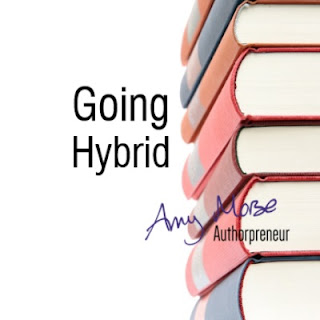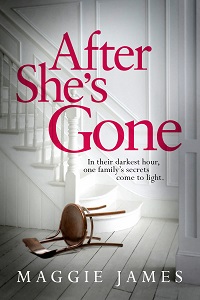I've been friends with Maggie James for a while now and interviewed her in March of last year on my Amy Morse Authorpreneur blog about her Self-Publishing Success Story
A year on, a lot has changed for Maggie and she's now planning her next overseas trip to write. I caught up with her recently, as she's just signed a new publishing deal, on the strength of her self-published portfolio and I was intrigued to know how this has changed her approach to her writing career...
1) Why did you choose to self-publish your books at the start of your career?
While I was working on my first novel, His Kidnapper’s Shoes, written during my time in Bolivia, my intention was to find a traditional publisher upon my return to the UK.
However, one day I got chatting to another traveller, also a writer. She suggested I look into self-publishing, which I did. The more I delved into self-publishing, I became convinced it was the way forward. It appeared to offer every advantage and no disadvantages.
Why settle for 10-15% royalties with a traditional contract when you can get 70% with Amazon? I decided I’d give it a go; I released His Kidnapper’s Shoes in 2013, followed by my other books.
Until early 2016, I had no intention of seeking a publishing contract. In fact, I often told people that should I be offered one, I would turn it down. As you’ll see below, I did just that, in 2014.
How things change!
I wasn’t expecting to receive a phone call one day that would alter everything. More of that later.
2) Have you been offered contracts by traditional publishers in the past?
Yes, I have.
My experience reinforced my conviction I didn't want a traditional contract.
At the start of my writing career, I self-published four non-fiction books I wrote during my time as a nutritional therapist.
A publishing company read one and then offered me a publishing contract, saying they believed my writing would fit in well with their catalogue.
3) Why did you accept/not accept it?
I needed little time to reject the contract they sent to me.
While I was flattered to be approached in this way, the terms were terrible, and I couldn’t see any point in signing it. That’s the problem with old-style publishing contracts; they’re biased towards the publisher and offer little financial incentive for authors.
4) What made you consider this publishing contract?
The first contract I signed was with Lake Union, one of Amazon’s publishing imprints.
Unlike the other one, it offered much better terms. As we know, Amazon operates differently!
I can’t go into details about the terms of my contract, but they are much better than you get with traditional publishing deals.
So how did this come about, given I wasn’t seeking to land a book contract?
Well, one afternoon I received a phone call from an acquisitions editor working for Lake Union in London. She told me how much she had enjoyed His Kidnapper’s Shoes, and that she was interested in exploring ways in which Lake Union and I could work together.
Over the next two weeks we swapped emails and spoke again on the phone, culminating is her offer of a two-book deal to republish His Kidnapper’s Shoes and my latest novel, After She’s Gone.
I decided having Amazon’s mighty marketing muscle behind my writing career could only be beneficial.
So far I have no regrets.
5) How does it differ from the process of self-publishing?
One benefit of self-publishing is that authors keep full control over their writing career. That isn't the case with my contract; Amazon retains the final say over my book titles and covers. A major plus was that I experienced the benefits of working with a top-notch editor. I learned a lot from her.
6) What has been the best part of the experience with the publisher?
I’ve found it a joy to work with a publisher where things happen on schedule and as expected.
It's still very early days; ask me again in a year!
I can’t predict how my books will do under the Amazon contract, but I'm optimistic.
Everyone at Lake Union is friendly, helpful and approachable. That means a lot.
7) What has been the worst?
A minor gripe is not having much say over my books’ titles or covers.
Having been used to having full control over every aspect of my writing, it's difficult for me to relinquish it.
8) Will you self-publish in the future or would you only accept a traditional contract?
I've now accepted a second contract, a two book deal with Bloodhound Books, another digital publisher like Lake Union.
They’ll republish my novels Guilty Innocence and The Second Captive later in 2017.
I based my decision on their impressive marketing record and the favourable reports of my friends who have signed contracts with Bloodhound.
Marketing is not my forte; I try my best but I feel my writing career can benefit from my contracts with Bloodhound and Amazon.
As for self-publishing, I'm still a big fan and continue to see it as a very positive step.
It's too early to predict how things will go with Amazon and Bloodhound, but I’ll probably end up being a hybrid author, with some of my books signed up to publishing contracts, and the rest under my control. We shall see!
9) What top tips would you offer to writers wanting to pursue the traditional route?
I'm not sure I'm qualified to offer tips, because my journey towards a publishing contract hasn’t been a typical one.
Neither Amazon nor Bloodhound can be considered traditional publishers; their approach is skewed towards digital books, which is why their terms are far more advantageous for writers.
If an author chose to pursue the traditional route, I'd encourage them to do so.
It's for each writer to decide the path of their career; just because I champion self-publishing doesn't mean it's right for everyone.
Many authors struggle with technology, so formatting digital files and maintaining a social media presence would be difficult.
The one thing I’d say is that there is no downside to self-publishing.
Some authors take the view that once you self-publish, you’ll never land a contract.
As my experience shows, this is not the case.
All my books under contract or which soon will be have been self-published, and it’s been no barrier towards being picked up by Amazon and Bloodhound.
10) How will this change your career goals for your future writing?
I'm not sure, but by the end of 2017 I’ll have more of an idea of how Amazon are performing with His Kidnapper’s Shoes and After She's Gone, and I’ll have Bloodhound Books’s figures for Guilty Innocence and The Second Captive.
Despite having been a full-time novelist for over two years, and it being four years since I published my first novel, I still feel very much a newbie at this game. T
hat means my writing career could go in any of several directions! Like my latest book, it’s a work in progress!
Thanks to Maggie for sharing her story and tips!
Maggie James is a British author who lives in Bristol. She writes psychological suspense novels.
Before turning her hand to writing, Maggie worked mainly as an accountant, with a diversion into practising as a nutritional therapist. Diet and health remain high on her list of interests, along with travel. Accountancy does not, but then it never did. The urge to pack a bag and go off travelling is always lurking in the background! When not writing, going to the gym, practising yoga or travelling, Maggie can be found seeking new four-legged friends to pet; animals are a lifelong love!
Find out more about Maggie's work and connect with her here:
Twitter: https://twitter.com/mjamesfiction
Pinterest: http://www.pinterest.com/maggiejamesfict/
Authorgraph: https://www.authorgraph.com/authors/mjamesfiction




No comments:
Post a Comment